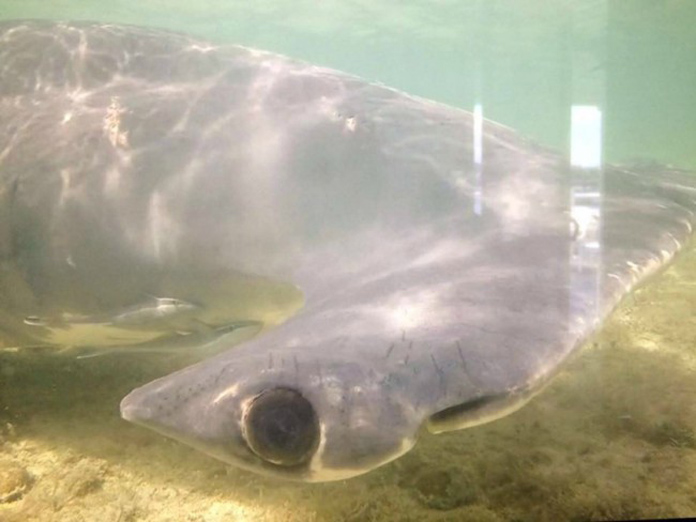
By Bahamas National Trust
Last week videos circulated on social media featuring a 14-foot Great Hammerhead shark off the Montagu foreshore in just inches of water. The Bahamas National Trust (BNT) would like to use this opportunity to clarify some of the confusing information that accompanied many of these posts.
The Great Hammerhead (Sphyrna mokarra)n, is the largest of the hammerhead sharks and is found in tropical and sub-tropical waters around the world. Mature hammerheads have virtually no predators, but like most shark species, they are heavily fished, both commercially and recreationally.
As a result, their numbers are rapidly declining and they have been listed by the International Union for the Conservation of Nature (IUCN) as endangered. Like many sharks, these “lions and tigers of the sea” play a crucial role in maintaining the balance of marine life that humans benefit from, especially in The Bahamas.
We are now aware that sharks are able to keep marine animal populations healthy by removing the sick and injured, and by promoting greater fish diversity and healthier coral reefs.
The Great Hammerhead, in particular, should be hailed as a keeper of the conch. They are directly responsible for controlling predators (like stingrays) which feed on the Queen Conch (Lobatus gigas, formally Strombus gigas).
On the eastern coast of the United States for example, sharks were decimated to such an extent that they no longer functioned as top predators. This led to an unprecedented explosion in cownose ray populations off North Carolina, which produced major declines in commercially valuable shellfish populations.
There is a real possibility that this could happen to the conch fishery in The Bahamas if we don’t have hammerhead sharks keeping the stingray populations in check.
Their importance to the culture and economy of The Bahamas is the reason why sharks were formally protected by the government in 2011. However, more public education on shark behaviour is clearly needed.
This was evident from the discussions that followed the recent social media posts. Many commenters were surprised that such a large shark would come so close to shore, but as most fishermen are aware, this is a regularly observed behaviour. Hammerheads prefer to eat the Southern Sting Ray (Dasyatis americana) which often comes into shallow water to feed and hide from predators.
This shark is very inquisitive and was possibly drawn to the Montagu area by the intense smell of skinned conch and fish, hoping to find a few rays. Much of the social media conversation focused on the danger to swimmers. But although these sharks certainly have the ability to cause harm, they rarely even acknowledge divers in the water. People swim with Great Hammerheads and other large sharks every day in The Bahamas without incident.
In fact, several videos were posted showing snorkelers in the water with the shark, and it was obvious that the animal was not interested in the swimmers. The mouth structure of this species is not suited for attacking a large animal like a human as it is adapted for catching bottom dwellers like rays. Swimming with such majestic beasts is an amazing experience however, caution should always be exercised.
A common reaction to such a large predator within an area frequently used by people is to spear it, either to kill it or drive it away. This is not just a local reaction, but rather an international one. Reports indicate that this may be what happened to the large visitor in Nassau harbour over the weekend. Hopefully, the shark was not killed but has moved on to quieter pastures.
“The BNT recently received new funding from the Pew Global Shark Program to conduct more public awareness activities,” said Executive Director Eric Carey. “We are also reviewing legislation and consulting with our conservation partners and scientists in order to develop protocols to guide our approach to these situations.”
In this case, those responsible likely acted with what they thought were good intentions to drive away the shark. However, there was minimal risk to humans.
For more information about the laws regarding sharks or any other information about these often misunderstood animals, please do not hesitate to contact the Bahamas National Trust. Tel: 393-1317, email: bnt@bnt.bs, or look for us on Facebook and Twitter.









